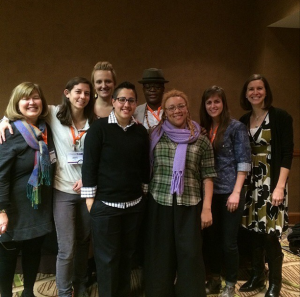The 26th National Conference on LGBT Equality: Creating Change made its home in downtown Denver, Colorado, February 4-8 2015.
We had nearly 4,000 people from all over the country attend our five-day program that featured over 390 workshops, training sessions, meetings and events, and four unbelieveably spectacular plenary sessions.
Vanderbilt Divinity students Sara Green, Robles, Sherry Brewer, and Sarah Connette attended, along with The Carpenter Program’s Carlin Rushing (Program Coordinating Fellow) and Lyndsey Godwin (Assistant Director). This year the Divinity School also partnered with the Center for Gay and Lesbian Studies at the Pacific School of Religion to co-host a caucus called “Queering Theological Studies;” and our Assistant Dean of Admissions, Vocation, and Stewardship coordinated with over a dozen schools from across the country to co-host the first ever Theological Schools reception at Creating Change. Vandy’s attendees presented workshops, engaged in discussions, and met with activists, educators, and faith leaders from across the nation, particularly in Creating Change’s “Practice Spirit, Do Justice” track. This track of workshops is sponsored by the E. Rhodes and Leona B. Carpenter Foundation, the same foundation that supports our Carpenter Program and through which our attendance was made possible.
 This was my first Creating Change. I had heard about this life-changing experience from friends who attended the national LGBTQI conference last year. They had told me of all the things they learned and all the people they met. When I was chosen to represent Vanderbilt Divinity School, I was thrilled—even more so to share the trip with good friends. This year at Creating Change, the weather was warm in Denver, and I was ready to learn. Before getting to the conference, I noted that I wanted to get new ideas about self-care and social justice work, and more of how spirituality plays into queer identities. When I actually arrived, I was overwhelmed with the volume and fierce energy of the people around.
This was my first Creating Change. I had heard about this life-changing experience from friends who attended the national LGBTQI conference last year. They had told me of all the things they learned and all the people they met. When I was chosen to represent Vanderbilt Divinity School, I was thrilled—even more so to share the trip with good friends. This year at Creating Change, the weather was warm in Denver, and I was ready to learn. Before getting to the conference, I noted that I wanted to get new ideas about self-care and social justice work, and more of how spirituality plays into queer identities. When I actually arrived, I was overwhelmed with the volume and fierce energy of the people around.
The first session that I attended was the day-long embodied leadership workshop that included a lot about self-care in the first half of the day and movement exercises in the second half. The self-care portion was amazing. I heard from fellow VDS student, Asher, on ways that we can reclaim rituals that are meaningful to us and about other healing justice work being done in Portland, Maine. The second portion of the class really got me convicted on a few things on which I have been working. I was able to see my tendency to shrink at work in certain exercises as well as my habit of creating a portrait or façade of what I want the world to see of me. Some of those exercises caught me off guard with regards to what I would learn about myself.
For the rest of the conference, I attended a wide range of sessions including Carlin’s workshop on healing from spiritual trauma, polyamory 101, and queering theological schools. All of the sessions were so affirming and inspiring; it was a quick growth spurt in my life. When I think about what is the one thing that sticks out to me most from my experience at Creating Change, I would have to point to the conversations I had during Carlin’s spiritual trauma workshop. I have noticed, since attending Creating Change, that too many organizing spaces (especially in the North and West) leave spirituality/Christianity unaddressed. For me this raises several issues: 1) that people have not had much contact with progressive and affirming churches, thus they continue to refer to “The Church” as a single-faceted oppressive-in-nature institution; 2) Southerners who enter in these spaces feel odd about bringing up spirituality in their local organizing work; and 3) we are missing out on opportunities for even more intersections by not talking about ways in which religion can be anti-oppressive. I can’t wait to go to Creating Change next year to further this conversation at the intersection of sexuality, spirituality, and social justice. I want to see us push ourselves in ways that expand our definition of community and inclusivity. I can’t wait to go to next year’s conference to celebrate the progress that my queer social justice warriors have been making in their communities.
Sara Green
MDiv’17